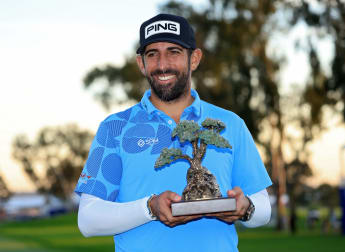By Mathieu Wood
Through sport, people from diverse backgrounds can come together. The sense of community it fosters is one of its greatest assets.
But what if a disability results in a fear of being unwelcome and prevents you from taking part? It can stop you trying before you have even started.
Neurological conditions such as autism, a lifelong disability, affects how people communicate and interact.
According to the National Autistic Society, there are about 700,000 adults and children on the autism spectrum in the UK. Like all people, they have their own strengths and challenges they each face.
One such person is Michelle Lau.
Anxiety, lack of focus, communicating with others, physical and sensory issues, forgetting to eat or drink and fatigue all provide their difficulties to playing the golf for Lau, for whom noise was a particular challenge when playing other sports at a younger age.
Partly for that reason, the Englishwoman turned to golf in the summer of 2021, five years after first getting a taste of it at a Get into Golf initiative in the UK.
“I was playing hockey and football but because I am injury prone, I just needed something a little gentler and quieter because I do struggle with noise,” she says.
“I needed something to manage my mental health as well which is why I thought I would give golf a try because it seemed a bit gentler, and my dad plays as well.”
Like in any walk of life, people often look to someone for inspiration when they decide to take something up. Lau was no different.
She was compelled to play the game by Erika Malmberg, who like her is on the autism spectrum. The Swedish golfer has been vocal in addressing misunderstandings about a disability that isn’t visible, something Lau is incredibly thankful for.
“I actually found out about EDGA and signed up for my first tournament because of Erika Malmberg,” Lee tells the European Tour group.
“She is very transparent and honest about her autism. To then discover that there is this whole community and this whole other sport… I was like ‘OK, maybe I can do something here as well’. Certainly, Erika is a big inspiration of mine.
“The community is great, everyone is really welcoming, and I have not come across a single person yet who has asked, ‘what is she doing here?’
“That was a worry for me, having a neurological disability rather than a physical one.”
Lau, 34, describes herself as “very logical and very analytical”.
“I love researching absolutely anything,” she says with a smile, before explaining what she has come to learn about the impact of golf on her disability.
“A lot of people don’t realise that with autism, the underlying state is anxiety, so your cortisol levels are generally increased.
“So, golf is good in that respect but with it being an outdoor sport you are subject to the elements.
“I have to find that balance because [if not] then it means I get very overly tired and that is when autistic fatigue can set in, where it starts impacting speech, movement and balance.”
The hope for me is that I would like to encourage other people, especially those who have a disability and feel they want a welcoming environment because maybe other able-bodied sports are a little too overwhelming initially
What comes across from Lau is her growing love for golf and the opportunities it has provided her. She is speaking at the G4D Tour’s inaugural Net tournament earlier this year in Ras Al Khaimah, where she was one of two female players in the ten-strong field.
Lau finished fourth in her G4D Tour debut in January, three strokes adrift of winner Robin Rambo Singh of South Africa.
But it is the growth of the tour since its inception in 2022, through the support of EDGA and the European Tour group, highlighted by the upcoming G4D Tour event to be held in conjunction with a PGA TOUR tournament that is most important to Lau.
“The hope for me is that I would like to encourage other people, especially those who have a disability and feel they want a welcoming environment because maybe other able-bodied sports are a little too overwhelming initially,” she says.
“For me, it is not about being an inspiration to someone, it is getting other people to have the benefits that I have had from EDGA and from golf. It is beyond great.”
Lau has found a community that she feels supported by, at ease within, and hopes others’ lives continue to be transformed for the better through golf.
“Without EDGA, I don’t think any of this would have been a possibility for me and other disability golfers. I don’t think I can express how grateful I am for this [opportunity] really,” she concludes, with tears in her eyes.







